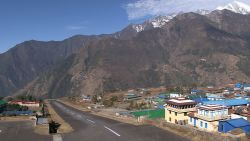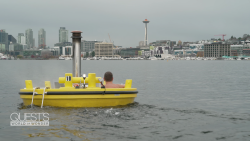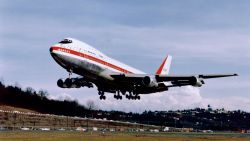The partial government shutdown in the United States raises all sorts of questions for travelers on topics from aviation safety and security to passports and national parks.
Here’s where things stand on travel:
Many national parks open, without facilities
Although National Park Service sites across the country have been closed during previous government shutdowns, many have initially remained open – but severely understaffed – under the Trump administration.
As the shutdown continues, closures are more likely.
Many park sites have had to curtail operations in some areas because of the shutdown.
“For most parks, there will be no National Park Service-provided visitor services, such as restrooms, trash collection, facilities or road maintenance,” said Jeremy Barnum, a National Park Service spokesman. Some services may be available from concessionaires or other entities, he said.
Nearly 331 million people visited National Park Service sites around the United States in 2017. Letting millions visit the parks without ranger support will damage the parks, says former NPS director Jonathan Jarvis.
“Leaving the parks open without these essential staff is equivalent to leaving the Smithsonian museums open without any staff to protect the priceless artifacts,” Jarvis wrote in The Guardian.
California’s Joshua Tree National Park on Wednesday had to close its popular campgrounds because of health and safety concerns over near-capacity pit toilets.
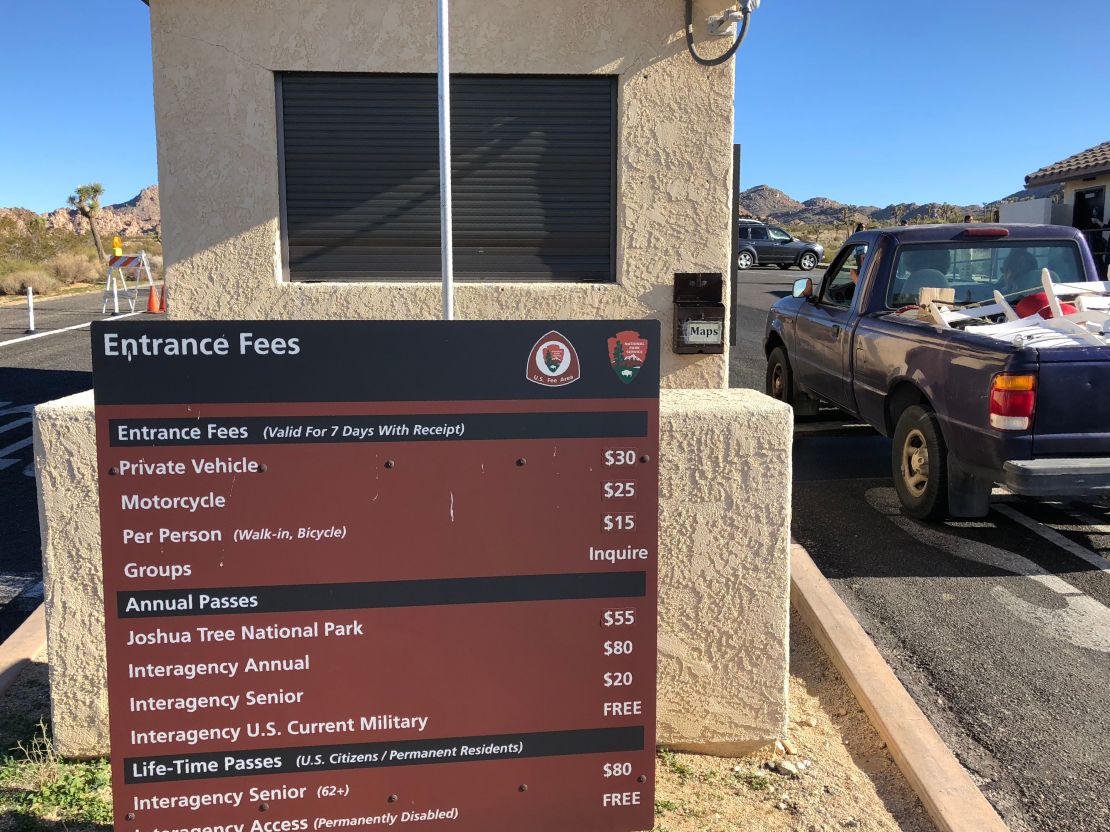
Emergency services are delayed at other parks, including Big Bend National Park in Texas, where a hiker broke his leg and was initially assisted by fellow visitors before meeting up with a park ranger.
Many national parks routinely close off some sections to visitors (or their cars) during the snowy winter months, including Grand Canyon National Park’s North Rim and Yosemite National Park’s Mariposa Grove.
But because of the shutdown, NPS staff can’t keep up with snow maintenance in all of the areas that remain open. That’s why Rocky Mountain National Park had to close its roads located higher than 8,000 feet. If the snow melts on its own, roads can be reopened.
The National Park Foundation, several states, businesses and non-profits are spending money to keep some national park sites open.
The National Park Service has signed more than 40 agreements with those entities to provide various visitor services, including trash removal and servicing restrooms, at a number of national parks, said NPS spokesman Barnum. How long these agreements last varies by location.
While some visitors are enjoying free entry into the national parks, only 27% of the park service’s 418 sites normally charge a fee.
Visitors should go to www.nps.gov and select “Find a Park” for additional information on access to specific parks and sites.
Smithsonian museums and National Zoo closed
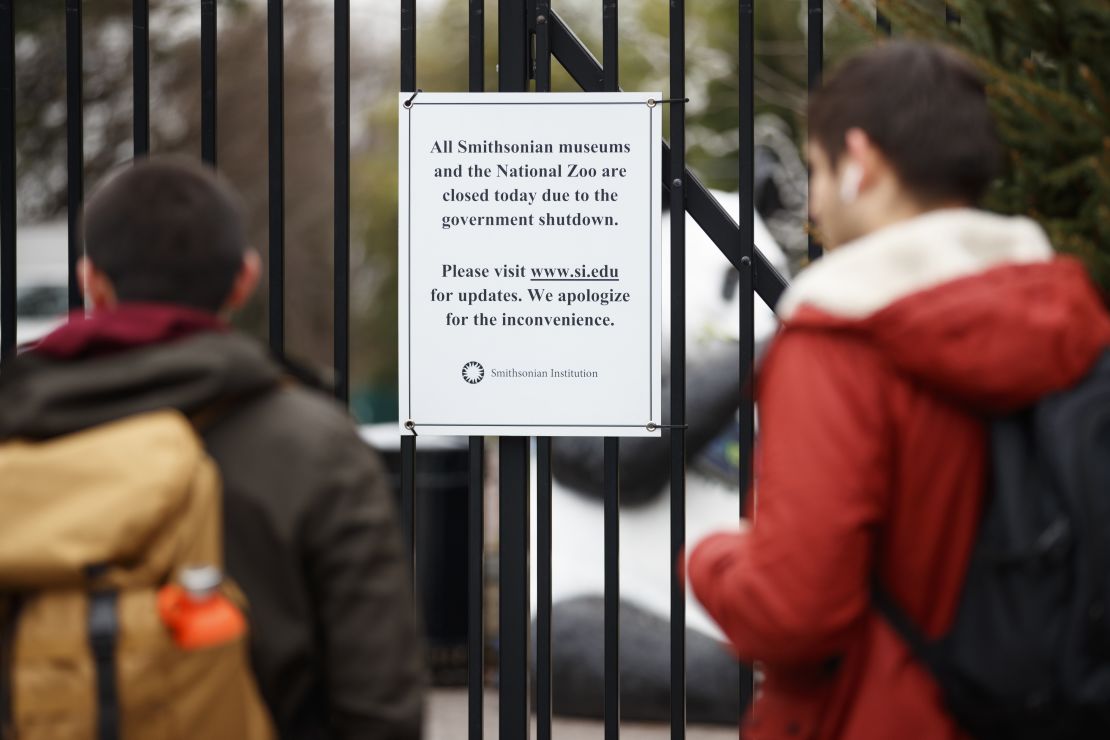
The 19 Smithsonian museums and the National Zoo in Washington closed their doors Wednesday as the partial government shutdown entered its 12th day.
“Due to the federal government shutdown, all Smithsonian museums and the National Zoo are closed,” the Smithsonian Institution said in a statement released Wednesday. Programming and events were also canceled.
In addition to the National Zoo’s grounds being closed to the public, its live-animal cameras – including the popular panda cam – will not be operating during the shutdown, the statement said.
The National Zoo plans to continue feeding and caring for the animals during the stalemate. “A shutdown will not affect the Zoo’s commitment to the safety of staff and the standard of excellence in animal care,” the statement read.
The government shutdown doesn’t mean the nation’s capital is closed to visitors.
“While we’re disappointed the Smithsonian Institution museums and National Zoo, National Gallery of Art and National Archives are temporarily closed, the vast majority of things for visitors to see and do throughout Washington, DC’s neighborhoods remain open,” said Ellliott L. Ferguson, president and CEO of Destination DC, the tourism office for the nation’s capital.
The tourism office has created a list of spots that are open to help visitors navigate the partial shutdown.
Air space operational, union forecasts delays
Although a union representing aviation safety workers warns of possible travel delays, air traffic is still moving along.
“The nation’s airspace is fully safe and operational. Air traffic controllers and the technicians who maintain the nation’s airspace system continue to work without pay as they fill a critical mission to ensure the public’s safety,” Federal Aviation Administration spokesman Gregory Martin said via email Thursday.
However, other agency activities have been curtailed, including air traffic controller training and accident investigation.
The FAA has closed its training academy in Oklahoma City during the partial shutdown.
The National Air Traffic Controllers Association, a union representing FAA air traffic controllers and other aviation safety workers, says the shutdown is likely to exacerbate an existing air traffic controller staffing shortage.
“This staffing crisis is negatively affecting the National Airspace System, and the shutdown almost certainly will make a bad situation worse,” NATCA President Paul Rinaldi said in a statement. “Even before the shutdown, controllers have needed to work longer and harder to make up for the staffing shortfall.”
A worsened staffing situation would mean reduced capacity in the airspace system, Rinaldi said, leading to more flight delays.
The FAA’s Martin said the agency is meeting targets for its 10-year air traffic controller staffer plan, and the agency will not speculate on any potential impact a training slowdown might have if the shutdown goes on for a long period of time.
Accident investigation by personnel at the FAA is currently limited to “emergency essential activities,” Martin said.
Those are “activities that protect life and property in which there is some reasonable likelihood that either or both would be compromised to some significant degree by the delay in the performance of an agency function,” he said.
Investigators were not dispatched to a weekend accident in Saginaw County, Michigan, involving one fatality due to a lack of resources. The FAA shares accident investigation responsibilities with the National Transportation Safety Board.
“Early indications suggest that operational factors may have contributed to this accident and currently there is no significant risk to transportation safety indicated,” Martin said of the incident.
“While the Sheriff cited concerns about accident site security, the wreckage has been recovered and moved to a secure salvage facility for subsequent investigation once investigators return,” he said.
Airport screening continues, but some screeners have called in sick
According to reporting from CNN’s Rene Marsh and Gregory Wallace, hundreds of Transportation Security Administration officers have called in sick from work this week from at least four major airports.
Marsh and Wallace spoke with two senior agency officials and three TSA employee union officials about the sick-outs.
“This will definitely affect the flying public who we (are) sworn to protect,” Hydrick Thomas, president of the national TSA employee union, told CNN.
TSA spokesman Michael Bilello told CNN the agency is monitoring the situation.
“Call outs began over the holiday period and have increased, but are causing minimal impact given there are 51,739 employees supporting the screening process,” said Bilello. “Security effectiveness will not be compromised and performance standards will not change.”
Bilello said wait times may be affected depending on the number of sick-outs, but so far wait times “remain well within TSA standards.”
He said 99.8% of the more than 2.2 million passengers screened by the TSA on Thursday waited less than 30 minutes.
Passports and visas still being processed
In an advisory released at the start of the shutdown, the Bureau of Consular Affairs said that “scheduled passport and visa services in the United States and at our US Embassies and Consulates overseas will continue during the lapse in appropriations as the situation permits.”
A US State Department official said facilities “will remain open as long as there are sufficient fees to support operations.”
Domestic passport agencies located in government buildings affected by a lapse in appropriations may be closed to the public, the official said.
Calls and inquiries will still be accepted by the National Visa Center, National Passport Information Center and Kentucky Consular Center, the Bureau of Consular Affairs advisory said.
The bureau’s website will not be updated, with the exception of urgent security information, the advisory said.
CNN’s Devan Cole, Rene Marsh and Gregory Wallace contributed to this report.






